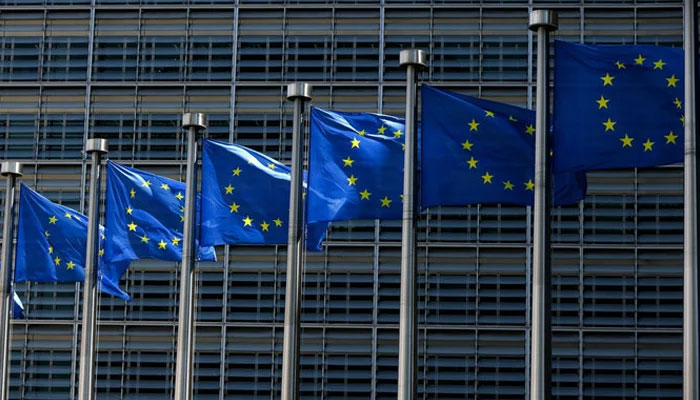EU officials unveil 1.5bn euro plan to boost arms industry
Officials also raised the prospect that the EU could use profits from frozen Russian assets to help Ukraine’s defence industry
BRUSSELS: Top European Union officials on Tuesday unveiled plans to boost the continent’s arms industry, arguing Russia’s war in Ukraine showed member countries should increase joint purchases of weapons and devote more spending to European firms.
The European Commission, the EU’s executive body, proposed spending 1.5 billion euros to give countries incentives to buy jointly from European firms and encourage industry to raise capacity and develop new technologies.
“In the past two years, we’ve faced a situation of a defence industry without sufficient production capacity to meet the sharp increase of demand,” Margrethe Vestager, a vice president of the Commission, told reporters in Brussels.
“We’ve been vividly confronted with the well-known structural fragmentation along national borders,” said Vestager.
She said EU national governments placing orders with favoured companies from their own countries limited economies of scale, created mistrust and prevented competition.
Vestager acknowledged 1.5 billion euros was “not a lot of money when it comes to the defence industry” but said it could still create incentives to get the EU’s 27 national governments - which have responsibility for defence - to work together.
Officials also raised the prospect that the EU could use profits from frozen Russian assets to help Ukraine’s defence industry or even buy arms for Kyiv. But EU members have yet to agree on how those funds should be used.
Alarmed by Russia’s war in Ukraine and bellicose rhetoric from Moscow towards the West, EU countries have sharply increased defence spending in recent years. Much of that money has gone to companies outside Europe.
Between the start of the war and June last year, EU states spent more than 100 billion euros on military equipment - 80 percent outside the EU, with more than 60 percent going to the United States alone, according to the Commission.
The Commission said on Tuesday the EU should aim to procure at least 40 percent of defence equipment “in a collaborative manner” by 2030 and spend at least 50 percent of defence procurement budgets within the EU by the same date.
The Commission also proposed a pilot programme to create a European version of the US Foreign Military Sales scheme, under which the United States helps other governments to buy from US arms companies.
“We don’t have a Pentagon anywhere. We don’t have an institution that has a strong buying capacity, driving the market and driving industry,” said EU foreign policy chief Josep Borrell. “But we have to cooperate and coordinate.”
To become reality, the proposals will need approval from the EU’s member countries – which have been reluctant to cede power on defence and military policy – and the European Parliament.
-
 Nicole Kidman Celebrates Galentine’s Day Months After Keith Urban Split
Nicole Kidman Celebrates Galentine’s Day Months After Keith Urban Split -
 Justin Bieber Unveils Hailey Bieber As First Face Of SKYLRK In Intimate Campaign Debut
Justin Bieber Unveils Hailey Bieber As First Face Of SKYLRK In Intimate Campaign Debut -
 Caitlin O’Connor Says Fiance Joe Manganiello Has Changed Valentine’s Day For Her
Caitlin O’Connor Says Fiance Joe Manganiello Has Changed Valentine’s Day For Her -
 Rachel Zoe Sends Out Message For Womne With Her Post-divorce Diamond Ring
Rachel Zoe Sends Out Message For Womne With Her Post-divorce Diamond Ring -
 James Van Der Beek's Final Conversation With Director Roger Avary Laid Bare: 'We Cried'
James Van Der Beek's Final Conversation With Director Roger Avary Laid Bare: 'We Cried' -
 Jaden Smith Walks Out Of Interview After Kanye West Question At Film Premiere
Jaden Smith Walks Out Of Interview After Kanye West Question At Film Premiere -
 Why Halle Berry Wasn't Ready For Marriage After Van Hunt Popped Question? Source
Why Halle Berry Wasn't Ready For Marriage After Van Hunt Popped Question? Source -
 Michelle Obama Gets Candid About Spontaneous Decision At Piercings Tattoo
Michelle Obama Gets Candid About Spontaneous Decision At Piercings Tattoo -
 Bunnie Xo Shares Raw Confession After Year-long IVF Struggle
Bunnie Xo Shares Raw Confession After Year-long IVF Struggle -
 Brooks Nader Reveals Why She Quit Fillers After Years
Brooks Nader Reveals Why She Quit Fillers After Years -
 Travis Kelce Plays Key Role In Taylor Swift's 'Opalite' Remix
Travis Kelce Plays Key Role In Taylor Swift's 'Opalite' Remix -
 How Jennifer Aniston's 57th Birthday Went With Boyfriend Jim Curtis
How Jennifer Aniston's 57th Birthday Went With Boyfriend Jim Curtis -
 JoJo Siwa Shares Inspiring Words With Young Changemakers
JoJo Siwa Shares Inspiring Words With Young Changemakers -
 James Van Der Beek Loved Ones Breaks Silence After Fundraiser Hits $2.2M
James Van Der Beek Loved Ones Breaks Silence After Fundraiser Hits $2.2M -
 Disney’s $336m 'Snow White' Remake Ends With $170m Box Office Loss: Report
Disney’s $336m 'Snow White' Remake Ends With $170m Box Office Loss: Report -
 Travis Kelce's Mom Donna Kelce Breaks Silence On His Retirement Plans
Travis Kelce's Mom Donna Kelce Breaks Silence On His Retirement Plans




